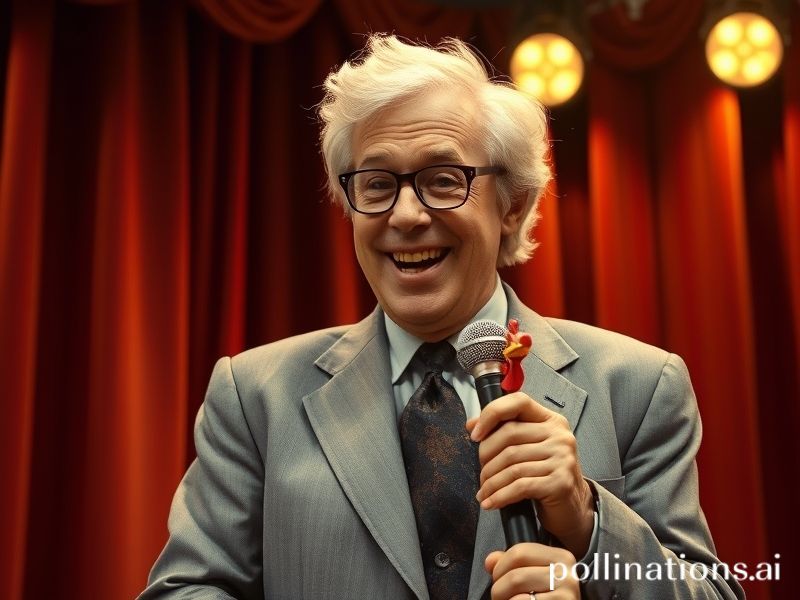Global Jester: How Mel Brooks Became the World’s Comic Relief for Dictatorship Depression
**The Last Laugh: How Mel Brooks Became the World’s Favorite Court Jester in an Age of Dictators**
In a world where authoritarian strongmen are staging a comeback like a bad 80s reboot, one 97-year-old Jewish comedian from Brooklyn has become an unlikely global icon of resistance. Mel Brooks, the man who taught us that “Springtime for Hitler” could be a showstopper and that the Spanish Inquisition works better as a musical number, has achieved something remarkable: he’s made genocide, fascism, and human suffering genuinely funny. Well, maybe not *genuinely* funny, but funny enough that we can breathe through the existential dread.
From Berlin to Beijing, Brooks’ particular brand of weaponized absurdity has become a universal language for those navigating the increasingly surreal landscape of 21st-century politics. When a Brazilian activist screens “The Producers” to explain Bolsonaro’s rise, or when Ukrainian soldiers quote “Blazing Saddles” while facing down Russian tanks, they’re tapping into something deeper than mere comedy. They’re using Brooks’ revolutionary thesis: if you can laugh at the monster, it can’t quite eat you whole.
The international appeal is no accident. Brooks’ immigrant father died when he was two, leaving him to navigate a world that seemed permanently tilted against the little guy. This perspective—that life is essentially a cosmic joke where the punchline usually involves getting squashed—translates remarkably well across cultures. Whether you’re a Palestinian comedian in Ramallah or a Hong Kong protester, the Brooks philosophy resonates: the world’s run by idiots with guns, so you might as well laugh before they shoot you.
His influence has permeated global popular culture in ways that would make a cultural studies professor weep into their organic kombucha. Turkish satirists borrow his breakneck pacing to skewer Erdogan. Nigerian Nollywood filmmakers adopt his anything-for-a-laugh ethos to tackle Boko Haram. Even in North Korea—assuming anyone’s managed to smuggle in a bootleg copy—”Spaceballs” probably plays like a documentary.
The genius lies in Brooks’ understanding that fascism, at its core, is ridiculous. The goose-stepping, the shouting, the elaborate uniforms that look like a fetish party gone wrong—all of it begs for mockery. By making Hitler a tap-dancing buffoon in “The Producers,” Brooks didn’t diminish the Holocaust’s horror; he weaponized laughter against those who would repeat it. It’s a lesson that’s spread globally: when Philippines’ Duterte declares martial law, activists respond with memes. When Hungary’s Orbán rants about immigrants, comedians turn his speeches into absurdist poetry.
But here’s where it gets darkly funny: as the world burns hotter and democracy retreats like a hairline, Brooks’ approach feels almost optimistic. His films suggest that yes, the world is run by maniacs, but they’re usually incompetent maniacs who can be defeated by sheer ridiculousness. It’s a comforting fiction in an era when the maniacs have nuclear codes and actually seem to know what they’re doing.
Perhaps that’s why international audiences have embraced Brooks with renewed fervor. From Parisian cinemas hosting midnight screenings of “Young Frankenstein” to Tokyo comedy clubs performing “Blazing Saddles” in Japanese, there’s a recognition that laughter might be the last firewall against barbarism. When everything else fails—the courts, the press, the opposition parties—there’s still the option of pointing and laughing until the emperor’s new clothes disappear in a puff of smoke.
As Brooks himself might say, tragedy is when I cut my finger; comedy is when you fall into an open sewer and die. On a planet rapidly transforming into an open sewer, we’re all learning to laugh on the way down. The joke’s on us, but at least we’re finally in on it.







